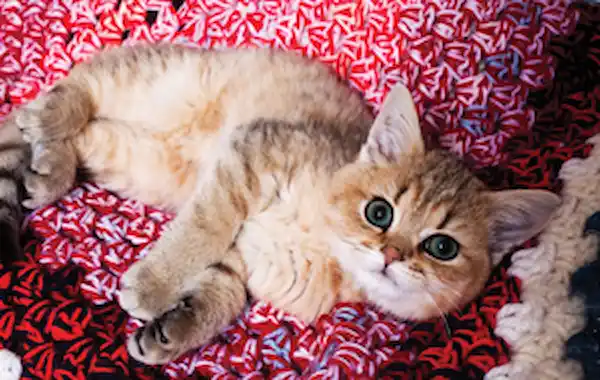Spot the signs of illness early in your cat by carrying our these quick and simple daily checks at home.
While your cat should receive a thorough annual examination from your vet, you can watch out for any changes on a day by day basis. Reward him with a treat when you have finished handling him to help your cat to associate this experience with a positive outcome.
- Examine your kitten's mouth and get him used to having his teeth and gums rubbed so you can clean them when he gets older. If plaque builds up it may have to be removed under general anaesthetic. Check for bad breath as this can be a sign of the onset of dental disease or kidney problems. A dental problem is one of the main reasons cats stop eating.
- Your cat's eyes should also be checked regularly. Look for redness, discoloration or discharge. There should be no sign of the third eyelid. The ears should also be clean with no discharge or odour. Head shaking or persistent scratching may be signs of ear mites. The nose and mouth should also be free from discharge and odour.
- Run your hands firmly over his body, checking his chest, tummy and tail for any lumps and bumps under the skin. Watch your cat for signs of tender spots.
- Feel for any matts in his coat or broken up scabs or crusts as these could indicate a bite wound. Look out for tiny flea droppings or actual fleas and excessively greasy fur, which could be a sign of skin problems.
- Check his skin by parting the fur. It should be clean, pale and free from dandruff.
- Check that his bottom is clean. A worm segment stuck to the fur could indicate tapeworm.
- Examine his paws for cuts and sores by gently looking between his pads. Also make sure his claws are not split or too long.
- It's a good idea to weigh your cat regularly and to know his optimum weight (your vet can help you with this). Weight can be a good indicator of general health.
Handling paws and claws
Claw clipping can be tricky so if you are at all unsure get a vet, vet nurse or professional cat groomer to show you where to make the cut.
Get your cat used to having his paws handled frequently by massaging and gently separating the toes on a regular basis. If you have a kitten, start this while he's still young. Your young cat's attitude to claw trimming will depend on how gentle and calm you are.
Ideally, have someone hold him for you so you can concentrate on clipping just the tip from each of the front claws. Do not go any no lower than the tip or you'll risk hurting him. Invest in a good pair of purpose-made cat claw clippers (available from pet shops) as this will help to make the task much easier.
How to hold a cat
Cats are independent creatures and don't always appreciate being held. Encourage your kitten to come to you by calling his name. Pick him up by putting one hand under his chest and supporting his bodyweight with your other hand. Kittens should be handled gently as their bones are still developing.
Never pick your cat up by the scruff of his neck. Mother cats will do this while moving their young kittens between nest sites, as it stimulates the 'scruff' reflex. This makes the kitten lie still and as very young kittens don't weigh very much this does not risk injury, but as the cat gets larger it becomes painful. Teach your children how to handle your cat. Show them how to stroke him gently and that they should let him go when he wants to.
Tooth care
Kittens lose their baby teeth just before they are six months old but as cats age, like all pets, they are more susceptible to dental problems, so it's important your kitten gets used to having his mouth, teeth and gums handled from an early age. A kitten's teeth should be white and free from staining. When he is relaxed, gently massage the mouth area.
Once your pet has accepted this process - probably over two or three sessions lasting a few minutes each - introduce a small amount of cat toothpaste on your finger and let your kitten lick it off.
When he's happy with this stage you can move onto massaging this onto the teeth with your finger. Progress onto using a pet toothbrush on a weekly basis. Remember that you should never force your kitten. Reward him with praise and cuddles as he progresses.
Cats may be fed oral care dry diets, which have a fibrous structure that acts a bit like the bristles on a toothbrush. In addition, there are various products that can be sprayed into the mouth or added to food to improve feline oral hygiene. Your vet will be able to advise on products suitable for your individual cat.







